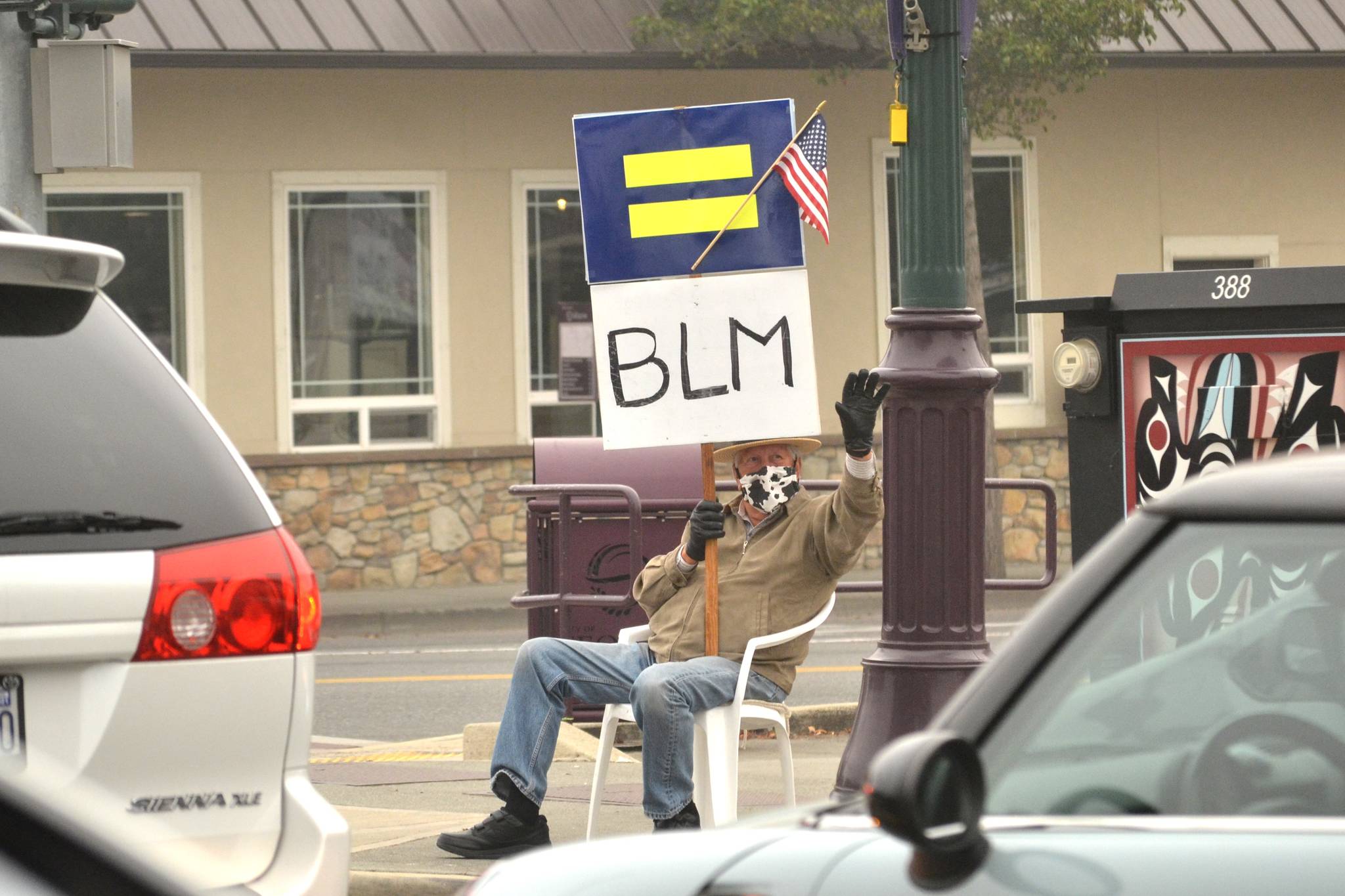This is Neil Morris.
A navy gunfire control technician during Vietnam. Telephone installer in Alaska. A Sequim resident for 30 years. And most recently a fixture at the northeast corner of Sequim Avenue and Washington Street as a Black Lives Matter and human rights advocate.
The 79-year-old has stood or sat at the intersection for more than 110 consecutive days since he learned of the abuse and death of Minnesota black man George Floyd on May 25.
“I always felt that I missed out in the ’60s,” Morris said. “I wasn’t involved in the racial stuff back then. I was busy in Vietnam.”
Reading and seeing news reports about the Minneapolis incident, Morris wondered what he could do. He and his wife Suzi have a history of being activists, he said, so he opted to hold a “BLM” sign and a Human Rights Campaign sign.
“I just want people to be aware,” Morris said. “I don’t know what else I could do. I piss off a lot of people and I think that is a good thing.”
In the days since Floyd’s death, Morris sets aside at least three hours each day to stand and wave. Support waivers between cheers and jeers.
“One guy told me I was going to make him puke,” Morris said. “He was telling me all about myself … And that’s what I find disheartening. People won’t take the time to do some research.”
Last week, someone (a black man) asked him how he felt about Black Lives Matter for the first time.
“That amazed me,” he said.
Morris said he was unaware that Black Lives Matter was an organization upon starting but feels there’s been bad connotations put upon it. He likened it to an attitude toward the Catholic Church, that being Catholic shouldn’t connect believers to convicted criminal church leaders.
“Some people feel because I associate with Black Lives Matter, that makes me a Marxist or a communist.”
His feeling: “For 400 years, Caucasians in this country have developed and purified a very sophisticated racist policy and it’s wrong. White people, we have to realize it’s our problem. We have to realize we created it.”
Up north
Prior to retiring in Sequim in 1990, Morris was born in Kentucky, raised in Michigan and spent 26 years in Alaska.
In the village of Bettles, Alaska (pop. 13, as of 2018), he made his living owning and operating a telephone company, which he said wasn’t unusual for Alaska due to primitive systems in place.
Beforehand, he and his brother Daryl had their own transport business for a number of years but quit because “we didn’t make any money,” Morris said.
He left Alaska for a few years, got married and came back to help his brother with his electricity business. With an electric generator, Daryl was able to sell excess power to locals.
“At that time, there was a single pay phone in the lodge … and that was the phone system when we started,” Morris said.
“To receive a phone call, you hung around in the lobby of the lodge and answered the phone when it rang.”
For a burgeoning business a lack of phones didn’t work, so that led Morris to start his own telephone business.
He eventually divorced and remarried Suzi, a school teacher in Bettles, where his two daughters attended school.
The couple went on to adopt a teen boy, King, from Thailand.
Part of his push for supporting BLM stems from supporting King, who is black.
“It’s a kind of obligation to protect your kids,” he said. “We were familiar with a lot of the incidents he had experienced and the racist stuff.”
Many years after starting their businesses, the Morris brothers sold both the telephone and electricity businesses.
His plan upon retirement? “To do nothing, and I was damn good at it.”
To Sequim
Through his brother Daryl, Morris and his family became acquainted with Sequim because his brother’s family would vacation here.
Over time, Morris and his wife worked with Clallam County’s family court as guardian ad litem — individuals appointed to investigate cases, usually divorcees fighting for children’s rights.
“They’d assign us to one of those kids and we would interview them and as many people as possible,” Morris said. “We’d provide information on what we felt the situation was.”
The couple enjoyed helping families in tough situations but due to hearing loss they both found it more difficult to continue.
Morris also took up woodworking to build his patience.
“I started making furniture and enjoying myself,” he said. “Then the wood, if dealing with good wood, was getting more expensive, and I wasn’t selling it or giving it away. There’s only so much space for furniture.”
Suzi continues to paint, sew and weave, he said.
The latest endeavor for Morris is advocating for equal rights.
But how long will he continue his seated stand for Black Lives Matter?
“I’ve been asking myself that and I don’t know; I’m shopping for winter clothing,” he said.
“I think it’s important that people keep these issues in mind,” Morris said. “Hopefully we’re making changes. People should be educated.”



